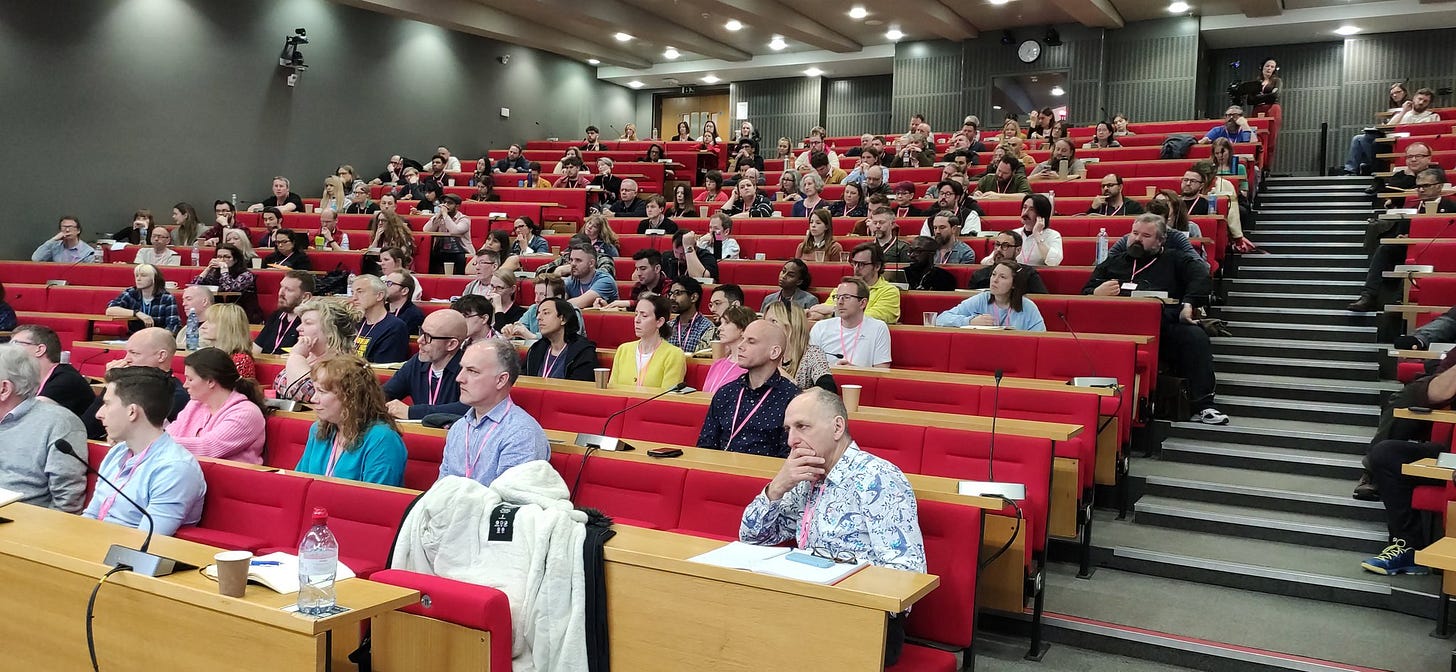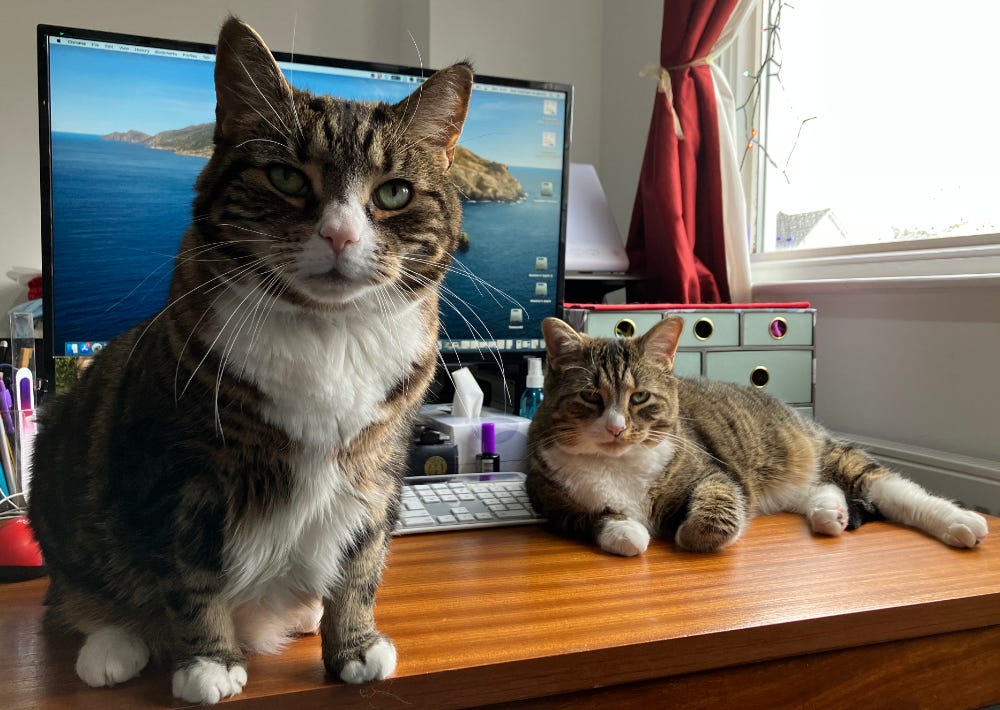Word Count 45: Big Comedy, Radio 4 open call, and US screenwriters vote to strike
Plus joining the dots, set-ups and payoffs, types of attention, and debut authors struggle with mental health.
If you’ve enjoyed reading Word Count – or you’d like to help keep Grabbity and Copurrnicus supplied with their favourite Rockin’ Lobster Temptations, which we have to get shipped over from America – please consider becoming a paid subscriber. For just £5 a month, you’ll get access to additional essays about writing, publishing, storytelling and more. You’ll also experience the warm glow of satisfaction that comes from knowing Grabbity is getting the treats she feels she deserves.
Hi there,
I rearranged my office yesterday. I’d been thinking about doing it for ages, because putting my desk right under the window meant that the difference in brightness between my screen and the window was giving me eye ache. I knew when I set this office up that it was a bad idea but, given how much crap I have to fit into this room, I didn’t think I had another choice. I hoped it would just work. It didn’t.
And if there’s a better metaphor for Tag’s pilot episode cold open that I know I need to kill, I don’t know what it is.
Past event: The Big Comedy Conference
I spent last Saturday in London at the Big Comedy Conference (audience picture above), organised by the British Comedy Guide, and it was fabulous. It was organised the way that all the best conferences are, with long breaks between sessions that prioritise quality over quantity.
Panel discussions covered the commissioning process and what producers do, about which I knew nothing, plus comedy characters and plotting, about which I already knew a bit. I learnt a lot, even in the sessions where I thought I already had a decent grounding, and found a lot of new jumping-off points for further reading.
If BCG organise another BCC next year, and you’re into any kind of comedy, I highly recommend going.
Opportunity: BBC Radio 4 open to sketch submissions
BBC Radio 4’s open-door sketch comedy show, DMs Are Open, is indeed open to submissions on a weekly basis.
For this series, DMs Are Open is going NON-TOPICAL. This means that we’re not looking for sketches based around news stories of the week. Instead, each episode will have a theme, and we want your sketches, one-liners and voice notes to fit into that theme. So you no longer have to start from a news story, instead your material should relate to the week’s theme. As long as your material has a connection to the theme, it’s got a chance of getting on the show.
This week’s theme is crime, and one-liners/voice notes submissions end today (sketch submissions closed yesterday), with the same schedule repeated for the next seven weeks. The next round opens today, and the final deadline will be 6 June.
News: US screenwriters vote to strike
I don’t often cover newsy news here, but I thought this story was worth mentioning. The Writers Guild of America’s members have voted by an overwhelming 98 per cent to authorise strike action if the WGA’s negotiations with the Alliance of Motion Picture and Television Producers (AMPTP) don’t go well. The WGA and AMPTP are currently thrashing out the next standard contract for writers and are thus discussing compensation. From Vulture:
“On TV staffs, more writers are working at minimum regardless of experience, often for fewer weeks, or in mini-rooms, while showrunners are left without a writing staff to complete the season,” the report states. “And while series budgets have soared over the past decade, median writer-producer pay has fallen.”
Fingers crossed that the WGA succeeds. Writers everywhere are underpaid and undervalued, so we need organisations like the WGA to stand up for them (us!).
Read this: Joining the dots
Author Michael Marshall Smith writes about how much more satisfying it is for readers/viewers to be left to join the dots in a story rather than have everything spelt out for them.
[W]hat’s interesting is that the audience is not only capable of joining these dots, but the process psychologically involves them far more compellingly in the story than you spelling it out for them would.
If you trust your reader/viewer to fill in the gaps, you give them the chance to “fill it in, in the process investing it with resonance from our own lives. When we do this, we truly feel it and believe it.”
Tweet of the week: Set-ups and pay offs and pay offs
Author and screenwriter David Hines has a great thread on Twitter (yes, the hellsite still produces some gold) on the relevance of magic to writing and in particular to the need to pay off your set-ups, twice if you can.
With regard to the Aliens power loader set-up and payoff, Hines says:
James Cameron's One Weird Trick is this: when he establishes a set-up, he pays it off *twice.*
This works because once the set-up is paid off, the audience stops looking for the payoff. They don't think it's coming back, so when it does, it's a legitimate surprise again.
Read the whole thread for the full analysis of why that payoff is so good.
Stop, look, listen: London Writers’ Salon, E55 – Dr Gloria Mark on types of attention
I love a good deep dive on the way that our creative brains work, and this episode from the London Writers’ Salon with Dr Gloria Mark, author of Attention Span, provides some fabulous insights into how attention works.
One important point that she makes that focus takes energy, and that after a long period of intense focus, “we have to switch our attentional states[.] We have to do something that doesn't involve a lot of mental effort.”
That’s something that it’s very, very easy to forget, especially when we feel so much pressure to get stuff finished quickly. Host Matthew Trinetti mentions research done by Mason Currey for his book, Daily Rituals, which found that a lot of creative people – artists, inventors, scientists – only did two to four hours of focused work per day. Mark agrees that for most people, if you get two hours of focused time in the morning and two in the afternoon, you’re doing well.
The whole interview is fascinating, and well worth a listen.
Read this, two: Preorders are a problem
Book publicist Kathleen Schmidt talks about the problems with pre-orders, and how the publishing industry’s reliance on them to “1) determine first printings, 2) plan budgets, and 3) get a better picture of the amount of marketing and publicity a book will need to make sales pop” is horribly flawed, not least because social media’s a shitshow these days.
Publishing currently faces a problem that I’ve yet to see addressed: If the algorithms on Twitter and other platforms are unreliable and an author needs to get preorders for their book, is it fair to say there is a lack of demand for a title if preorders are light?
Read this, three: Brace yourself
A survey by The Bookseller has found that “More than half of authors (54%) responding to a survey by The Bookseller on their experiences of publishing their debut book have said the process negatively affected their mental health.”
Among the majority who said they had a negative experience of debut publication, anxiety, stress, depression and "lowered" self-esteem were cited, with lack of support, guidance or clear and professional communication from their publisher among the factors that contributed.
Publishers can clearly do a better job of supporting debut authors, many of whom don’t yet understand how the industry works or what to expect. But I think it’s also important that authors take the time to learn from others’ experiences so that they can properly moderate their own expectations.
I hate to say it, but as authors we’re increasingly on our own, and it’s up to us to look after ourselves.
Suw’s news: Final chapter of The Gates of Balawat up now
I’m glad that I took a punt on publishing my urban fantasy (with a tiny hint of the romantic) novella here on Substack. It’s had nearly four times more readers there than it has had downloads as an ebook. If you haven’t read any of The Gates of Balawat so far, Chapter 1 is probably the best place to start.
I’ll continue to release my fiction on Substack, so keep an eye out for my next short story, The Lacemaker.
Obligatory cat picture
My repositioned desk has been a huge hit with Grabbity and Copurrnicus, and I’ve had one or the other, or sometimes both (until someone gets jealous), on it for most of the day. Which is lovely, but does make typing a challenge.
That’s it for this week!
All the best,
Suw





